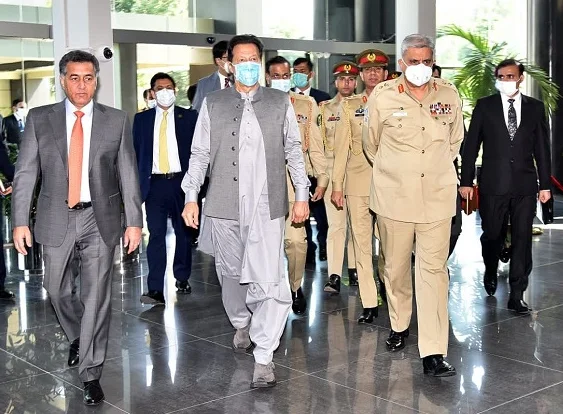Terrorist groups targeting India and Afghanistan continue to operate from Pakistani territory with the Imran Khan government failing to take any action against "known terrorists" who played a major role in the 2008 Mumbai terror attacks.
This was stated in the 2020 Country Reports on Terrorism (CRT) released by the United States' Department of State on Thursday which provides a deep insight on important issues in the fight against terrorism all over the world.
The report mentioned that Pakistan made limited progress on the most difficult aspects of its 2015 National Action Plan to counter terrorism, specifically in its pledge to dismantle all terrorist organisations without delay or discrimination.
It details that terrorist groups targeting Afghanistan — including the Afghan Taliban and affiliated HQN, as well as groups targeting India, including Lashkar e-Tayyiba (LeT) and its affiliated front organisations, and Jaish-e-Mohammed (JeM) — continued to operate from the Pakistani territory.
"Pakistan did not take action against other known terrorists such as JeM founder and UN-designated terrorist Masood Azhar and 2008 Mumbai attack 'project manager' Sajid Mir, both of whom are believed to remain free in Pakistan," the report mentions.
Pakistan remains on the grey list of the Financial Action Task Force (FATF), the global money laundering and terrorist financing watchdog, since June 2018 for non-compliance and unsatisfactory implementation of all Action Plan items targeting terrorist assets.
The US government also continues to suspend most of its security assistance to Pakistan.
Washington maintains that although Pakistan's national action plan calls to "ensure that no armed militias are allowed to function in the country," the country's government and military "acted inconsistently" with respect to terrorist safe havens throughout its territory.
It states that the Pakistani authorities did not take sufficient action to dismantle certain terrorist groups, including several UN and US-designated terrorist groups that focus on attacks outside the country and continue to operate from Pakistani soil, including the Haqqani Network, Lashkar-e-Tayyiba, and Jaish-e-Mohammed.
The report says that the Haqqani Network (HQN), designated as an FTO in 2012, is estimated to have between 3,000 and 5,000 fighters who continue to receive funding from donors in Pakistan to create unrest in Afghanistan.
Similarly, the report says, several other terror organisations like al-Qa’ida, Islamic State’s Khorasan Province (ISIS-K) Tehrik-e Taliban Pakistan (TTP), Harakat ul-Mujahideen, Hizbul Mujahadeen, Indian Mujahedeen, Harakat-ul Jihad-i-Islami (HUJI) continue operate from Pakistan and collect donations from wealthy donors of the country.
It also mentions that the Pakistani madrassas continue to teach violent extremist doctrine and have declined to register with the government or provide documentation of their sources of funding.
Even as it exposed the terror network in Pakistan, the US agencies appreciated the strengthening of its strategic partnership with the Indian government through bilateral engagements such as the Counterterrorism Joint Working Group, Designations Dialogue and the 2+2 Ministerial Dialogue.
"Indian counterterrorism forces, at the federal and state levels, actively detected and disrupted transnational and regional terror forces. The National Investigation Agency (NIA) examined 34 terrorism-related cases related to ISIS and arrested 160 persons, including 10 alleged Al Qaeda operatives from Kerala and West Bengal, in September," said the 2020 Country Report on Terrorism.
Also Read: Taliban regime seeks recognition at OIC meet in Islamabad, resistance leaders cry foul




















